86 articles

It takes some dedication to get excited about the European elections. Voter turnout has declined consistently since 1979, a tendency not reversed by the accession of the Mediterranean countries in two waves in the 1980s, or even by the enlargement of the 2000s, even though eastern European members make up a huge proportion of the electorate.
Bringing together a set of nations that have been competing and fighting since before the ‘nation state’ even existed, including ones who fought two world wars against each other within a century, the project is still grandiose enough. But, when it comes to this federation, political memory doesn’t seem to cut it for the masses.
Populist critics from East and West now campaign for more national sovereignty, while others demand more centralized efforts against corruption and anti-democratic developments. Some claim ownership of Project Europe in the name of the ‘core countries’; others take offence at this in the name of the semi-peripheries.
And yet, despite all these controversies, there is a tacit understanding among journalists and analysts that Europe is a bore to the general public.
As a network of European journals, Eurozine is in an excellent position to address this paradox. In our new series, The mood of the Union, partner editors from across the continent, together with further journalists and analysts, will be reporting on attitudes towards the elections and what is at stake at the national level. The aim is to provide a more detailed glimpse than one would usually catch from the bird’s-eye view of national media.
The series is curated by Agnieszka Rosner and edited by contributing editor Ben Tendler.
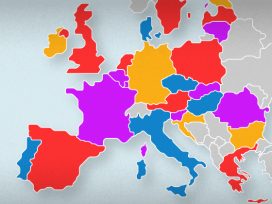

 Mood of the Union is published by Eurozine and sponsored by the ERSTE Foundation and the National Endowment for Democracy.
Mood of the Union is published by Eurozine and sponsored by the ERSTE Foundation and the National Endowment for Democracy.
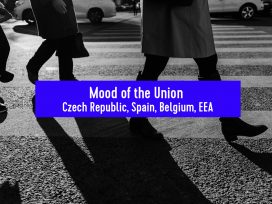
After May’s elections, Prague saw the largest public demonstration since the Velvet Revolution. The country now hosts the strongest Pirate Party in Europe, while Spain provides the largest national component in the S&D bloc. Norway may yet become Europe’s green battery, as Belgium faces a great divide.
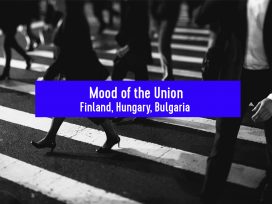
Peak populism could be said to characterize the political dynamic in all three countries, as Finns express the greatest dissatisfaction with the Right. But changes may well be on the horizon in Hungary and Bulgaria too, as the limits to euroscepticism become increasingly clear.

Police violence, mass detentions, internet shutdown, arrest of opposition candidates: the reaction to the latest protests in Moscow has been an overreaction even by the standards of the Russian authorities. It seems that the government has good reason to be afraid of putting its popularity to the test. But is it advised to ask what next, given the sheer weight of resistance to democratization in Russia?
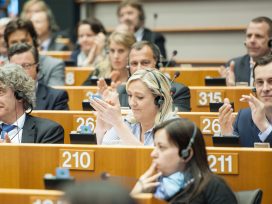
Despite far-right parties’ criticism of EU sanctions on Russia, at national levels they lack the foreign policy leverage to be of direct use to Moscow. The strengthening of the far-right bloc in the European Parliament is also unlikely to alter the EU’s position. Does this mean that Russian influence on European politics is negligible?
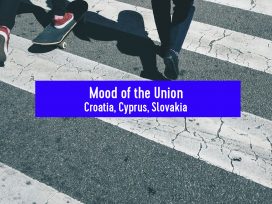
A mixed field of populists emerge in Croatia amid a loss of confidence in the status quo; Cyprus takes stock after a campaign defined by nationalism; and in Slovakia far-right advances underline the need for innovative politics.
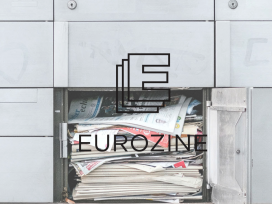
‘The Russians are in the pantry already!’ The European Union is finally starting to address the Kremlin’s political interference, but yet doesn’t address domestic disinformation.
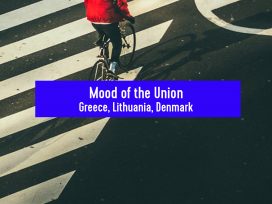
The results of Greece’s snap general election, triggered by Syriza’s defeat in May, are eagerly awaited. Support for the far-right Danish People’s Party has collapsed, while Lithuania has grown more conservative. But isn’t there more to European politics than national swings and roundabouts?
Although the Kremlin did try to interfere in European politics, focusing on Russia is misleading. Since some governments in the European Union are more interested in spreading fake news than stopping it, tackling disinformation cannot rely on them, Péter Krekó writes.
The conservative EPP and the Socialists & Democrats lost 71 seats between them in May’s election. Could this change the face of European politics? As Portugal exits austerity and Romania confronts corruption in politics, liberalism and populism thrash it out in France. The European centre will hold but must reach out.
What next for Britain and the EU? Though the Brexit Party will now be one of the largest national parties in the European Parliament, combined support for the ‘hard Remain’ parties is greater still. The EP election played out as a referendum on Estonia’s government too, while Latvia was spared a populist surge.
The European elections have been key to determining citizens’ priorities, albeit with one significant caveat in Ireland. In Poland, voters clearly care more about social welfare than abstract issues like rule of law. And issues of real consequence for the Western Balkans may finally be addressed, now that the elections are over.
The Labour Party’s surprising success in the Netherlands may merely have proven opinion polls wrong but the political earthquake experienced in Austria will clearly have lasting consequences. Both Austria and Malta happened to achieve gender equality among elected MEPs, prefacing a drive to achieve the same among appointments to top EU jobs.
Editors from the Eurozine network offer initial responses to the outcome of the European elections. First up are views from Bologna, Berlin and Maribor. As the Union itself seems less precarious than before the vote, new coalitions form to safeguard the climate on the one hand and nationalistic interests on the other.
The ‘containment’ argument fails to admit that, in order to reverse the Eurosceptic trend, Europe needs to confront its causes. Homilies about the rule of law will not do the trick. Addressing the rise of the right means reforming the European Union itself.
Regional differences seem to be the common denominator between the players of Project Europe. In an attempt to understand how the European vote is formed, we put some of the underlying issues on the map.



